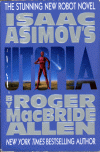It is hard to write a review about one of the most famous science fiction novels of all time, but I will try to do it justice. Asimov originally started the Foundation saga as a series of short stories for Astounding Magazine back in the 1940s. For the novelisation Asimov added the section “The Psychohistorians” to precede the original 4 stories that were published in the magazine. For those reading along with me in chronological order, most of this first story is covered in Foundation and Chaos.
The main plot of this novel revolves around Hari Seldon’s prediction that the Galactic Empire, which has ruled the galaxy for 12,000 years, will fall apart within 500 years. The chaos and civil war which will follow will last 30,000 years unless he is allowed to establish his Foundation to create the Encyclopedia Galactica. The project will store and protect all of the important human knowledge in order to help reduce the time until the rise of the Second Galactic Empire to 1,000 years. For a complete (spoiler filled) summary of the individual stories, refer to the Wikipedia article . I highly recommend reading the books for yourself first though.
The experience of reading Foundation in its chronological order is quite different that reading this book as the first in a series. With no other information available, Hari Seldon is portrayed more like a prophet or god-like figure. This must have been even more pronounced when “The Encyclopedists” was originally published as “Foundation” in 1942. Without the background listed in “The Psychohistorians”, there was no way to see Hari Seldon as a man interacting with others. He is referred to as a prophet of the Galactic Spirit, the founder of the religion of technology which takes place in “The Mayors”. Priests are trained to help operate the nuclear technologies to help the other worlds in the Periphery accept the ‘new’ technology easier. This made me think of the following quote…
Any sufficiently advanced technology is indistinguishable from magic.
–Arthur C. Clarke, “Profiles of The Future”, 1961 (Clarke’s third law)
In many ways the mathematical equations which make Psychohistory work are magic. The Foundation members have no idea why they are successful, except that it has been mathematically proven to happen with a high degree of certainty in the short term. In the long term it is possible for the “Seldon Plan” to deviate. This is where the Second Foundation comes in which is located at “Star’s End” across the galaxy. They were given the task to smooth out the bumps which would probably occur as the time went on.
Most of the stories end with what is called a Seldon crisis. This is a point where there Foundation gets into a situation where only one solution is essentially possible. I think the way that Asimov arranges these problems is intriguing because the solutions usually come from angles I’d never have suspected. He also develops strong characters such as Salvor Hardin and Hober Mallow, which become as beloved as Hari Seldon to those of the Foundation.


